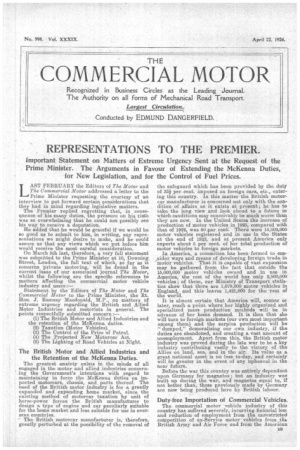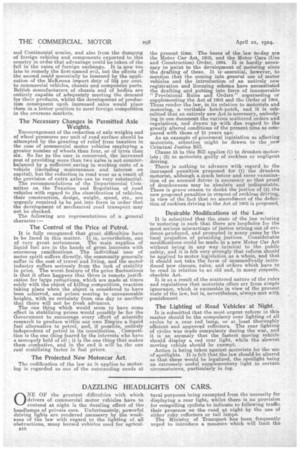REPRESENTATIONS TO THE PREMIER.
Page 1

Page 2

If you've noticed an error in this article please click here to report it so we can fix it.
Important Statement on Matters of Extreme Urgency Sent at the Request of the Prime Minister. The Arguments in Favour of Extending the McKenna Duties, for New Legislation, and for the Control of Fuel Prices.
LAST FEBRUARY the Editors of The Motor and The Commercial Motor addressed a letter to the Prime Minister requesting the courtesy of an interview to put forward certain considerations that they had in mind regarding legislative matters.
The Premier replied regretting that, in consequence of his many duties, the pressure on his titre was so overwhelming that he could not possibly see his way to receive a deputation.
He added that he would be grateful if we would be so good as to submit to him, in writing, aey representations we might desire to make, and he could assure us that any views which we put before him would receive the most careful consideration.
On March 5th last, therefore, a very full statement was submitted to the Prime Minister at 10, Downing Street, London, the full text of which, so far as it concerns private motoring, will be ,found in the current issue of our associated journal The Motor, whilst the following are the specific references to matters affecting the commercial motor vehicle industry and users:— Statement by the Editors of The Motor and The Commercial Motor to the Prime Minister, the Rt. Hon. J. Ramsay Macdonald, M.P., on matters of extreme urgency regarding the British and Allied Motor Industries and motorists in general. The points respectfully submitted concern :—
(1) The British Motor and Al3ied Industries and the retention of the McKenna duties.
(2 Taxation (Motor Vehicles). (3 The Control of the Price of Petrol.
(4 The Projected New Motorcar Act.
(5) The Lighting of Road Vehicles at Night.
The British Motor and Allied Industries and the Retention of the McKenna Duties.
The greatest anxiety exists in the minds of all engaged in the motor and allied industries concerning the Government's intentions with regard to maintaining in force the McKenna, duties on imported motorcars, chassis, and parts thereof. The need of the British motor industry is for a greatly expanded and expanding home market, since the existing method of motorcar taxation by unit of horse-power forces the British manufacturer to design a type of engine and car peculiarly suitable for the home market and less suitable for use in over. se as countries.
The British motorcar manufacturer is, therefore, greatly perturbed at the possibility of the removal of the safeguard which has been provided by the duty of 33i per cent, imposed on foreign cars, etc., entering this country. in this matter the British motorear manufacturer is concerned not only with the condition of affairs as it exists at present; he has to take the long view and look ahead to a future in which conditions may conceivably be much worse than they are now. In the United States the increase of production of motor vehicles in 1923, compared with that of 1922, was 50 per cent: There were 15,000,000 motor vehicles registered and in use in the States at the end of 1923, and at present America only exports about 5 per cent, of her total production oi motor vehicles to foreign markets.
In America, a committee has been formed to eon„sider ways and means of developing foreign trade in motor vehicles. That it is capable of vast expansion may be gathered from the fact that outside the 15,000,000 motor vehicles owned and in use in Anaenca, the rest of the world has only 2,500,000 vehicles ; of these, our Ministry of Transport statistics show that there are 1,079,000 motor vehicles in England, and this leaves 1,421,050 for the rest of the world.
It is almost certain that America will, sooner or later, reach a point where her highly organized and specialized mass• production methods will be in advance of her home demand. It is then that she will turn to foreign markets (our own most important among them) and the surplus production will be "dumped,” demoralizing our own industry, if tha duties are abandoned, and creating a vast amount of unemployment. Apart from this, the British motor industry was proved during the late war to be a key industry contributing vastly to the victory of the Allies on land, sea, and in the air. Its value as a great national asset is no less to-day, and certainly will be greater in the event of any upheaval in the near future.
Before the war this country was entirely dependent upon Germany for magnetos' but an industry was built up during the war, and magnetos equal to, if not better than, those previously made by Germany are now being produced here by British labour.
Duty-free Importation of Commercial Vehicles.
The commercial motor vehicle industry of this country has suffered severely, incurring financial lost and reduction of employment from the unrestricted conipetition of ex-Service motor vehicles from th‘ British Army and Air Force and from the American
and Continental armies, and also from the dumping of foreign vehicles and components exported to this country in order that advantage could be taken of the fall in the rates of foreign exchange. It is now too late to remedy the first-named evil, but the effects of the second could materially he lessened by the application of the McKenna import duty of 33* per cent.
• to commercial vehicles, chassis and component parts. British manufacturers of chassis and of bodies are entirely capable of adequately meeting the demand for their products, whilst the development of produc.tion consequent upoh increased sales would place them in a better position to meet foreign competition in the overseas markets.
The Necessary Changes in Permitted Axle Weights.
Encouragement of the reduction of axle weights and of wheel pressures per unit of road surface should be attempted by the granting of relief from taxation in the case of commercial motor vehicles employing a greater number of wheels than four, or of tyres than six. So far as the user is concerned, the increased post of providing more than two axles is not counterbalanced by a sufficient saving in working costs of a vehicle (including maintenance and interest on capital), but the reduction in road wear as a result of the provision of extra axles can be very substantial. The recommendations of the Departmental Committee on the Taxation and Regulation of road vehicles with regard to the classification of vehicles, their construction, design, weight, speed, etc., are urgently required to be put into force in order that the development of mechanical road transport may not be checked.
The following are representations of a general character :—
The Control of the Price of Petrol.
It is fully recognized that great difficulties have to be faced in this matter. It is, nevertheless, one of very great seriousness. The main supplies of liquid fuel are in the hands of great interests with enormous ramifications. The individual user of motor spirit suffers directly, the community generally suffer in the cost of travel and living, and the motor industry suffers seriously from the lack of stability in price. The worst feature of the price fluctuations is that it often happens that there is remote justification for large reductions, which are made at times solely with tile object of killing competition, reaction taking place when the object is considered to have been achieved, and prices soaring to unreasonable heights, with no certainty from one day to another that there will not be fresh advances.
The one thing which would seem to have some effect in stabilizing prices would possibly be for the Government to encourage every effort of scientific research to produce within our own Empire a liquid fuel alternative to petrol, and, if possible, entirely independent of petrol in its constitution. Competition is the one thing feared by the interests who have a monopoly hold of oil it is the one thing that makes them combative, and in the end it will be the one real stabilizing factor in fuel prices.
The Projected New Motorcar Act.
The codification of the law as it applies to motoring is regarded as one of the outstanding needs at
the present time. The bases of the law to-day are the Motor Car Act, 1903, and the Motor Cars (Use and Construction) Order' 1904. It is hardly necessary to point to the development of motoring since the drafting of these. It is essential, however, to mention that the coming into general use of motor vehicles and the introduction of an entirely new registration and, licensing scheme have necessitated the drafting and putting into force of innumerable "Provisional Rules and Orders" superseding or supplementing the Act of 1903 and the Order of 1904. These render the law, in its relation to motorists and motoring, a veritable hotch-potch, and it is submitted that an entirely new Act is necessary, embodying in one document the various scattered orders and regulations, and drawn up with due regard to the greatly altered conditions of the present time as compared with those of 21 years ago.
As an. example of piecemeal legislation as affecting motorists, attention might be drawn to the new Criminal Justice Bill.
Clause 35 in this Bill applies (1) to drunken motorists; (2) to motorists .guilty of reckless or negligent driving.
There is nothing to advance with regard to the increased penalties proposed for (1) the drunken motorist, although a much better and surer examination of an accused driver is necessary so that proof of drunkenness may be absolute and indisputable. There is grave reason to doubt the justice of (2) the new proposed penalties in respect of reckless driving, in view of the fact that no amendment of the definition of reckless driving in the Act of 1903 is proposed.
Desirable Modifications of the Law.
It is submitted that the state of the law relating to motoring is such that there are loopholes for the most serious miscarriage of justice arising out of evidence produced, and prompted in many eases by the local prejudice of presiding justices. Considerable modifications could be made in a new Motor Car Act without being in any way inimical to the public -safety, and it is felt very strongly that reform should be applied to motor legislation as a whole, and that it should not take the form of spasmodically introduced new clauses, rules, and orders which have to be read in relation to an old and, in many respects, obsolete Act.
It is as a result of the scattered nature of the rules and regulations that motorists often err from simple ignorance, which is excusable in view of the present state of the law, but is, nevertheless, always met with punishment.
The Lighting of Road Vehiclesat Night.
It is submitted that the most urgent reform in this matter should be the compulsory rear lighting of all cycles by a rear red lamp, or at least thoroughly efficient and approved reflectors. The rear lighting of cycles was made compulsory during the war, and it is an anomaly that the fastest moving vehicle should display a red rear light, while the slowest moving vehicle should be exempt. Action is being taken against motorists for the use of spotlights. It is felt that the law should be altered so that these would be legalized, the spotlight being an extremely useful supplementary light in certain circumstances, particularly in fog.


























